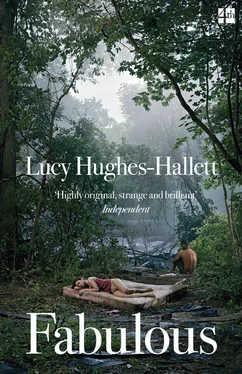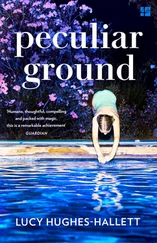And so he found Cinnamon Wharf.
Two hundred years ago that part of London was the end point of a journey from the other side of the earth. The merchants and ship-owners who lived in the handsome houses around Wapping Pier Head wanted pepper on their coddled eggs and nutmeg on their junket. Their daughters stuck cloves into oranges at Christmastime, in a neat tight knobbly pattern, and suspended the prickly balls in their closets, making their gowns aromatic. And what the merchants and their girls wanted, they reckoned others would want too, and would buy. The bales of sprigged calico and ivory-coloured muslin unloaded in Limehouse were scented by the spices that had travelled across the world alongside them in the hold. Prices were exorbitant, and fluctuated. With the arrival of every homing cargo they halved or, in the case of the more recherché cardamom, quartered. Shrewd traders stored sacks-full of the shrivelled seeds to await the next shortage and its advantageous effect on profit. By the time John Company ceded control of the spice-trade to the Queen-Empress’s government the north shore of the Thames was walled, from Tower Bridge to Shadwell, by high buildings whose brick had blackened by the end of their first winter, and whose timbers were so imbued with the fragrant oils seeping out of the sacks that to walk along Wapping High Street was to imagine yourself in the southern oceans, where sailors used to navigate between islands by sniffing the perfumed breeze.
You see, we estate agents aren’t all as weaselly and money-mad as we’re cracked up to be. It’s possible to feel the romance in London real-estate. And, so long as none of us ever lost sight of what we were there for, Diana was quite happy to hear us introduce a bit of history into our sales pitches. As long as the bathrooms and kitchen facilities were slap up to date, buyers could get quite excited about old-timey glamour.
Acton hung around and hung around and one day he was doing shoulder rotations outside the front door of the empty warehouse when a Bentley drew up, holly-green, so high off the ground there were fold-down steps for the passenger door. Headlights the shape of torpedo-heads mounted on the sides to add to its already prodigious width. Cream-coloured leather seats. Must have been seventy years old but looked box-fresh. The driver went round and opened the back door and a wizened little man got out. He needed the step.
He said, ‘You can stop doing that. I know what you’re after.’
Acton said, ‘I’m delighted to meet you at last, Mr Rokesmith.’ He’d done his research.
It all slotted into place. Acton put Rokesmith together with a contractor, and soon the Wharf had begun to smell, not of a Christmas-special latte, but of fresh plaster.
The flats were super-big. That was Acton’s idea. He said, ‘People buy a loft-style apartment because they want to pretend they’re in downtown Manhattan with Jackson Pollock throwing paint around downstairs and Thelonius Monk jamming on the roof. They want places to party in. They want rusty iron beams and pockmarked floor-planks a foot wide. And what do they get? Bijoux little pods with wet rooms, because there’s no room anywhere big enough for a bathtub. Places where you have to get on your hands and knees to look out of the window, because those idiot developers keep cramming in more floors. I tell you, Mr Rokesmith, if we can give them what they really want, you’ll be a rich man.’
Rokesmith was amused. It was ages since he’d met anyone who’d pretend not to know that he was already about as rich as it was possible to be.
They sold the flats one or two at a time, always holding back the biggest one on the top floor. ‘We’ll make this the coolest address in town,’ said Acton. ‘They’ll be tearing each other’s fingernails out to get it.’ Rokesmith didn’t like that kind of talk. Violence was serious. Casual allusions to it offended him. Acton didn’t always read him right.
He found him buyers though, the desirable kind. Single professionals. High net worth individuals. Metro-cosmopolitans. People whose job descriptions – consultant, content-provider, start-up strategist, marketing guru, director of comms – gave nothing away about what they actually did. A shop opened on Wapping High Street selling second-hand spectacle-frames in white Bakelite – the kind that golden-age Hollywood stars wore. You could have them made up to your own prescription, with photo-sensitive lenses. The greasy spoon turned into a cupcake café, and then a tapas bar, and finally settled down to being a gluten-free bakery. They started serving non-alcoholic pink prosecco in the pub. The bike-boys who arrived nightly at Cinnamon Wharf to deliver ready-meals featuring swordfish carpaccio and coriander-roasted salsify would pause if they saw Acton tapping in the security code, a couple of cool youngish people in black nylon jackets at his back, and give him a high-five.
I liked him, I really did. And not just because he cut me in on a bit of extra for the second-floor flats. I’m solid and he was flash. I like being shaken up a bit. People are always surprised when they meet Sophie. No one expects me to have a wife with teal-striped hair. What they don’t get is that my winter tweeds and summer seersucker are fancy-dress too. Only in my case the artificial persona is Mr Trad. I polish my performance. I have a gift for dullness, for the fusty-musty. It has been useful to me, both professionally and in reconciling me to those aspects of my early life that I have no plans to revisit, not in conversation, not even alone and in silence in the long early-morning hours when I lie rigid, willing myself not to toss and turn. I have made myself into a lump of masonry – safe and sound and durable, no damp patches or shoddy construction. Having done so successfully, I enjoy being around gimcrack and glitter and trompe l’oeil.
So … the parties. Those Sunday nights. When the weekend’s big push was done, there’d be trays of oysters delivered direct from Whitstable, and iced mint julep and vodka shots in gold-etched Moroccan glasses, all laid out in the empty penthouse at the top of Cinnamon Wharf. A dedicated lift went straight up there. You’d step out and, beyond the roof terrace’s glass balustrade, the river’s darkness would be all around, black water heaving almost imperceptibly, reflecting the hectic orange and magenta of a city at night.
Eliza came the first time. She was an excellent agent – proactive with sellers, confiding and cosy with buyers – but it’s not always easy being the only woman on a team. I get that. On Tuesday morning (none of us customer-facing lot worked Mondays) she went into the glass box that was Acton’s office, and pulled the blinds down as though what she had to say shouldn’t be seen, let alone heard. After that she transferred to Lettings. Acton always treated her with the most perfect politeness. Behind her back though, especially when Diana was about, he referred more often than was really called for to the Manningtree Road debacle. Maybe Eliza missed a trick there, but I thought it was small-minded of him. It was ages ago and, anyway, let’s face it, we all let slip an opportunity now and then.
By the time summer kicked in he’d stopped calling us his boys. He called us his dogs. Sundays, he’d invite clients, those he thought would be titillated by it – single men, the sort who wanted dimmer switches in the wet rooms. Mostly though, it was just us. ‘I’m whistling up the pack,’ he’d say to whoever was leaving the office with him.
To begin with, each time, it was all pretty raucous – everyone feeling that shiver as the pressure came off while the adrenalin was still way up there, and then the giddiness as the alcohol hit. Later, as the first of us started talking about the last train home, the atmosphere would shift and a different lot would be filtering in. Very young, all of them, very thin, female and male and some you couldn’t be sure about. Their English was as uncertain as their immigration status, but they weren’t there to make conversation.
Читать дальше











